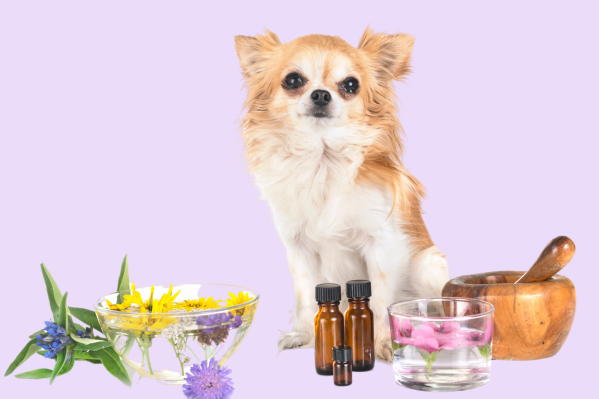Essential oils are one of those health and wellness buzz phrases that are sometimes hard to really understand or necessarily even define if you are not familiar, but at their core, they are oils extracted from plants. That is probably implied by the name essential oils, but doesn’t really explain their purpose or why we would use essential oils on pets. These oils are said to capture a plant's scent and flavor, or "essence."
Essential oils are usually extracted from those plants through distillation (this can happen through steam and/or water) or cold pressing, much like the olive oil we put on our salads. Because of their connection to nature and their perceived wellness benefits, essential oils are often used for aromatherapy. They are very popular in everything from perfumes to cosmetics, but what about using essential oils on our pets?
There is not currently a large body of scientific research on the benefits of essential oils — and even less about the impact of essential oils on pets. But essentials oils have been in practice since 4500 BC, and there are quite a few holistic doctors (and a ton of anecdotal evidence) that swear by them. But are they safe for pets?
“As it relates to diffusing aromatherapy, this should be done conservatively around pets and in very well-ventilated rooms,” says Kathy Sadowski, an essential oils expert and registered aromatherapist."
Expert aromatherapists agree that essential oils should not be used without following the advice of a veterinarian knowledgeable about essential oil chemistry. “As it relates to diffusing aromatherapy, this should be done conservatively around pets and in very well-ventilated rooms,” says Kathy Sadowski, an essential oils expert and registered aromatherapist. Always choose a room where the pet knows how to get in and out easily in the case they are feeling nauseated from the aromas.
It is also important to be aware that not all pets are the same. “Sensitivities and possible dangerous reactions can be different based on the type of animal, its size, age, medical conditions, and if it is in a cage,” adds Sadowski.
Essential Oils & Your Pet’s Wellness
As with humans and their own health issues, what may seem to do wonders for one pet may not make a difference in another! “Essential oils are powerful and often misunderstood, and their qualities can be quite diverse, but also overlapping at times,” says Jessica Gore, a pet nutritionist and dog trainer.
Not all essential oils are safe for all animals, and may become toxic in certain doses. “Tea Tree is an example of a very common essential oil that is especially toxic to cats,” warns Jessica Gore, nutritionist and dog trainer.
With this in mind, precaution should be used as not all essential oils are safe for all animals, and may become toxic in certain doses. “Tea Tree is an example of a very common essential oil that is especially toxic to cats,” warns Gore. “Although we know that some essential oils can have a significant impact on the nervous system and more, there are definitely critics who do not believe in the significance or value in essential oils,” says Gore.
Potential Benefits Of Essential Oils On Pets
There has been some research that suggests essential oils may have some health benefits for pets, and to that end, there are some veterinarians that incorporate essential oils into their treatment. Some essential oils do appear to be beneficial when used correctly. For example, lavender oil seems to have antibacterial, antifungal, and anti-anxiety properties, and may be useful in the treatment of some skin infections and as a stress reliever, says Dr. Jennifer Coates, DVM, who serves on the advisory board for Pet Life Today. For those hopeful about the potential benefits, essential oils have been used to treat everything from anxiety and skin problems to flea and tick prevention.
Other essential oils often associated with pet care include chamomile to help with an upset stomach, Frankincense to help with stress and anxiety, ginger to help with joint pain, and cedarwood to help treat fleas.
How To Choose The Right Essential Oils
Some essential oils are certainly more potent than others. Most essential oils do not really help your pet. “They will help make them smell a little better, but there are no proven medical benefits,” explains Sara Ochoa, DVM, veterinary consultant for doglab.com.
There is a very small safety margin in these oils, and your dog only needs a very small amount, or they will be sick. “Some essential oils are highly toxic to animals,” warns Dr. Ochoa.
“While people can often safely apply undiluted essential oils directly to their skin, doing so in dogs and cats can be very dangerous,” says Dr. Coates. Never give pets essential oils orally.
Dogs and cats are more sensitive to the side effects of essential oils than are people. “While people can often safely apply undiluted essential oils directly to their skin, doing so in dogs and cats can be very dangerous,” says Dr. Coates. Never give pets essential oils orally. The base of the neck just above the shoulder blades is a good application site for diluted essential oils because it is difficult for pets to lick this area.
Essential Oils That Are Toxic To Cats
Cinnamon oil
Citrus oil
Clove oil
Eucalyptus oil
Oil of sweet birch
Pennyroyal oil
Peppermint oil
Pine oils
Tea tree oil
Wintergreen
Ylang ylang

Essential Oils That Are Toxic To Dogs
Pennyroyal oil
Pine oils
Tea tree oil
Wintergreen
What To Do If Your Pet Has A Negative Reaction To Essential Oils
“Signs of toxic exposure to essential oils may include drooling, vomiting, diarrhea, muscle tremors, unsteadiness, lethargy, depression, changes in the heart and breathing rates, or seizures,” says Dr. Coates.
“Signs of toxic exposure to essential oils may include drooling, vomiting, diarrhea, muscle tremors, unsteadiness, lethargy, depression, changes in the heart and breathing rates, or seizures,” says Dr. Coates.
These potential reactions are why it’s so important not to use an essential oil on a pet without first speaking with an experienced veterinarian. “The doctor can tell you which essential oils would be safe and effective based on the condition being treated and your pet’s species, age, health, etc,” explains Dr. Coates. They will also tell you how the oil should be diluted and applied. Purchase only therapeutic grade essential oils to reduce the risk of your pet being exposed to contaminants.
Basic Safety Guidelines For Using Essential Oils On Pets
Avoid using essential oils with fish, amphibians, reptiles, birds, and small mammals, says Sadowski. “With cats and dogs, only administer essential oils topically or internally if you have very specific directions from a veterinarian trained in essential oil chemistry,” adds Sadowski.
In homes with cats and dogs, use diffusers in a well-ventilated room with the animals having a possible exit route to get away from the smell.
Avoid the use of essential oils around pregnant, nursing, young, old, or sick furry animals. Never diffuse essential oils near caged animals or an animal’s favorite sleeping spot.
Avoid the use of essential oils around pregnant, nursing, young, old, or sick furry animals. Never diffuse essential oils near caged animals or an animal’s favorite sleeping spot.
Dilute, Diffuse, And Use Essential Oils Sparingly
Essential oils are very potent in their pure form and the best way to use them for or around your pet is to dilute them and diffuse sparingly. They can be diluted with any other liquid, such as a more benign oil, or plain old water! “Dilute essential oils more heavily around cats and dogs,” says Sadowski, “Diffuse for short 10-minute intervals once or twice a day. Never diffuse all day long!.” Always discontinue using essential oils immediately if you notice any adverse reactions in your pet.
If You're Worried About Your Pet
Contact your vet if you have any questions about using essential oils with your specific pet and their specific health needs and call Animal Poison Control if you believe your pet has been dangerously exposed to essential oils. Here is the phone number: 888-426-4435.
